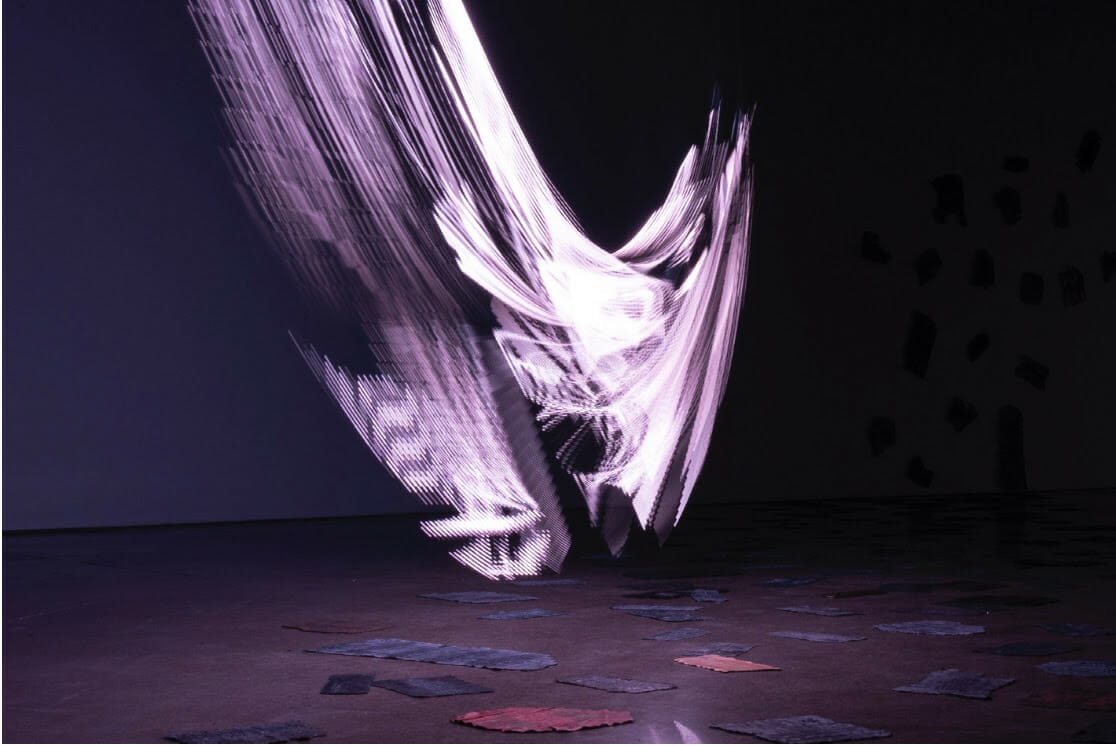Los Angeles…Since the 1970s, Jenny Holzer has deployed language as her medium, mobilizing poetic, political and personal texts to speak to our experiences of power, violence, joy, despair and idealism. Beginning 1 September, the renowned American artist will present new and recent paintings and robotic LEDs at Hauser & Wirth’s West Hollywood location, marking her first major exhibition in Los Angeles since 2012 and the first time she has employed artificial intelligence (AI) technologies in her text-based practice. Through her timely reflections on the American experience over the last four decades—including the country’s current shift into the latest phase of the Information Age, the burgeoning era of AI—Holzer has always pushed the frontiers of contemporary art and language, and this new group of works is no exception.
Among the new works Holzer has created for the exhibition are two robotic vertical LEDs installed side by side, each displaying AI-generated texts. The latest development in a career-long conceptual exploration of both original and borrowed language, the artist’s experiments with AI pose new questions of authorship prompted by the re/ degenerate nature of new technology. In the LED titled ‘GOOD’ (2023), an AI tool was instructed to describe rapturous experiences—human and nonhuman, physical and immaterial. Its responses were poetic descriptions of emotional sensations and natural phenomena, as well as nonhuman experiences and entities such as machine sounds and extraterrestrials. Selected texts were programmed to rise along the four sides of the work in pastel hues. In ‘BAD’ (2023), extremist political content was fed to the generator, which was then asked to compose short statements and cryptic poems evocative of the far right and alt-right. These passages flash, spin and pulsate across the LED in shades of gray and bursts of red. The texts activate all sides of both LED columns while animating the space through their individually choreographed robotic movements. The works are presented not as adversarial counterparts, but as a complete sensorial depiction of complex parallel experiences, both human and artificial. From joyful and contemplative to aggressive and chaotic, the LEDs evoke the unpredictability and unknowability of AI’s current reach and future potential.
Also on view is ‘WTF’ (2022), a swinging LED beam that displays tweets posted by Donald Trump during his presidency and posts by Q, the eponymous leader of the QAnon conspiracy movement. ‘WTF’ slides along a track in an unpredictable cadence, echoing the erratic rhythm with which these messages first appeared online. The flashing and scrolling texts illuminate nearly 300 ‘curse tablets’ scattered across the floor. Inspired by the curse tablets of the Greco-Roman world, which were inscribed with citizens’ wishes for vengeance and curses upon their foes, Holzer’s tablets feature tweets by Trump, echoing the LED above them. They were created by stamping the tweets onto cast metal, then distressing and aging the objects through crumpling, folding, piercing and chemical baths. Like deformed or molten iterations of the artist’s previous evocations of public plaques, these damaged tablets suggest refuse, wreckage and devastation. Together, these works form a time capsule of the recent past while signaling the possible near future, both recording and reflecting the hyperbolic, enraged rhetoric that characterizes the contemporary political and media landscape.
The gallery walls are lined with Holzer’s latest works from her ongoing series of Redaction Paintings, which are based on her decades-long research into declassified government documents. Holzer has taken pages from these sources and transferred them to linen by hand, meticulously layering their contents and censored revisions with oil paint and metal leaf. The paintings include references from FBI records concerning the Patriot Act, Trump- era briefs, and a 2021 report from the US National Security Commission on Artificial Intelligence that analyzes the rapid advancement of AI technology. The luminous and richly textured surfaces of these new works explore both real and perceived dangers to democracy through the ongoing and interconnected tumults of current-day politics.
About the artist
Born in 1950 in Ohio, USA, Jenny Holzer received a BFA in painting and printmaking at Ohio University, an MFA in painting from Rhode Island School of Design in 1977 and participated in the Whitney Museum’s Independent Study Program. Much of Holzer’s education was in the liberal arts at Duke University and the University of Chicago, a broad intellectual foundation that underpins her multidirectional artistic practice. While her early efforts centered on painting, she quickly turned to text and dynamically incorporated new technologies to thread her work through public space: Holzer’s oeuvre is just as accessible in museums and galleries as on storefronts, billboards and T-shirts, and in New York’s Times Square.
Hauser & Wirth
901 E 3rd St, Los Angeles, CA 90013, United States
